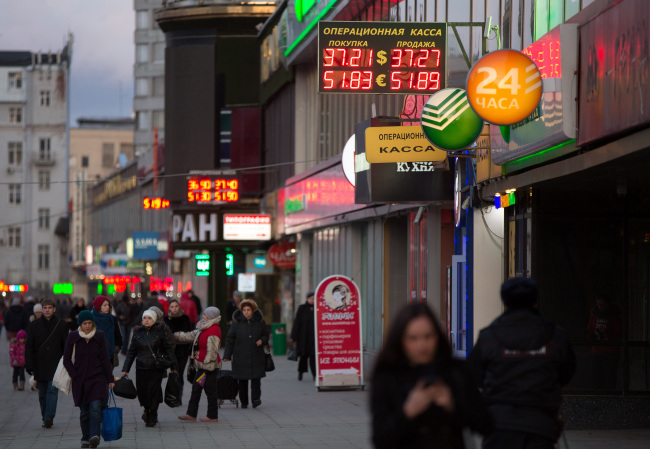Western sanctions are pushing Russia toward recession and the pain could intensify if U.S. and European leaders turn the screw over tensions in Ukraine.
Banks including state-run VTB Capital say the world’s ninth-biggest economy will shrink for at least two quarters as penalties for annexing Crimea rattle markets, curb investment and raise the cost of borrowing. Sanctions that have so far focused on individuals via visa bans and asset freezes may be expanded to target specific areas of the economy.
President Vladimir Putin sent his popularity surging to a five-year high by making Crimea a part of Russia again after 60 years and says he won’t be swayed by foreign retaliation. Even so, the costs of the decision are starting to unfold, with Russian stocks this year’s worst performers and the economy set to suffer more than the West, Mircea Geoana, Romania’s government representative for diplomacy and economic projects.
 |
Pedestrians pass illuminated signs advertising foreign exchange rates in Moscow. (Bloomberg) |
“We’re witnessing the start of a new geopolitical and economic Cold War and I think it will take at least two to three years to establish some sort of equilibrium,” he said. “The ones who’ll pay the bill for this aggression, no matter how popular and patriotic it looks, will be the Russian people because there’s a huge difference between the economic force of the EU and the U.S. and that of Russia.”
Russia’s Micex stock index has plunged 13.1 percent this year compared with a 5.8 percent decline for the MSCI Emerging Markets Index. The ruble is the second-worst performer against the dollar behind Argentina among 24 developing-market currencies tracked by Bloomberg, weakening 9.3 percent.
After the U.S. expanded sanctions March 20 to include businessmen linked to Putin, such as billionaires Gennady Timchenko and Arkady Rotenberg, Standard & Poor’s and Fitch Ratings cut their outlook on Russia’s credit grade to negative from stable, suggesting a downgrade is most likely next.
The two companies, which said Western banks are becoming reluctant to lend to Russia, rate the world’s biggest energy exporter at BBB, the second-lowest investment grade and on par with Brazil and South Africa.
Even before the standoff with the West, the worst since the Cold War, Russia’s economy was facing the weakest growth since a 2009 recession as consumer demand failed to make up for sagging investment. The current situation in the economy “bears clear signs of a crisis,” Deputy Economy Minister Sergei Belyakov said March 17 after the first European Union and U.S. sanctions.
Russia will probably dip into a recession in the second and third quarters of this year as “domestic demand is set to halt on the uncertainty shock and tighter financial conditions,” according to Moscow-based VTB. (Bloomberg)




![[Herald Interview] 'Trump will use tariffs as first line of defense for American manufacturing'](http://res.heraldm.com/phpwas/restmb_idxmake.php?idx=644&simg=/content/image/2024/11/26/20241126050017_0.jpg)

![[Health and care] Getting cancer young: Why cancer isn’t just an older person’s battle](http://res.heraldm.com/phpwas/restmb_idxmake.php?idx=644&simg=/content/image/2024/11/26/20241126050043_0.jpg)

![[Graphic News] International marriages on rise in Korea](http://res.heraldm.com/phpwas/restmb_idxmake.php?idx=644&simg=/content/image/2024/11/25/20241125050091_0.gif)